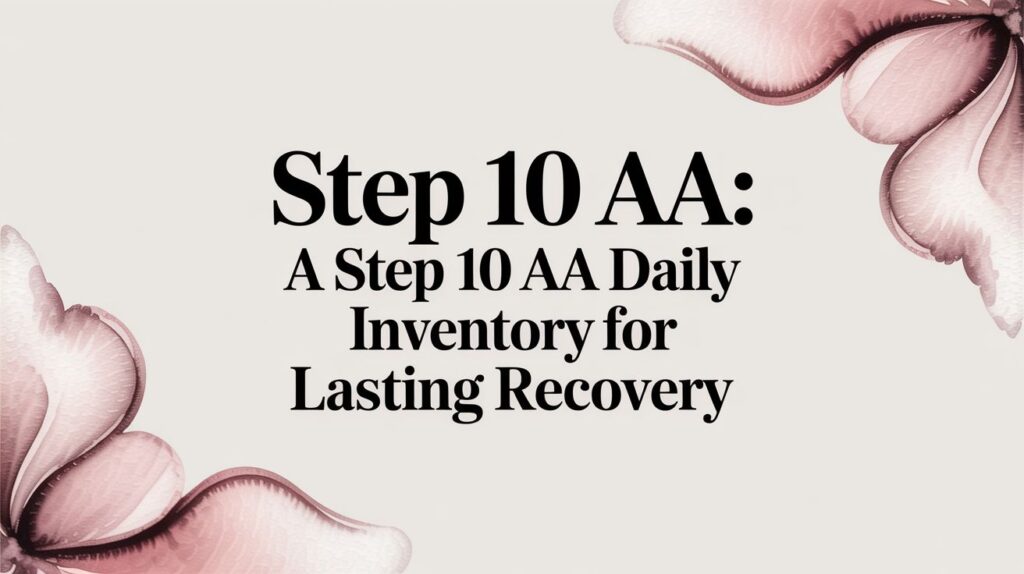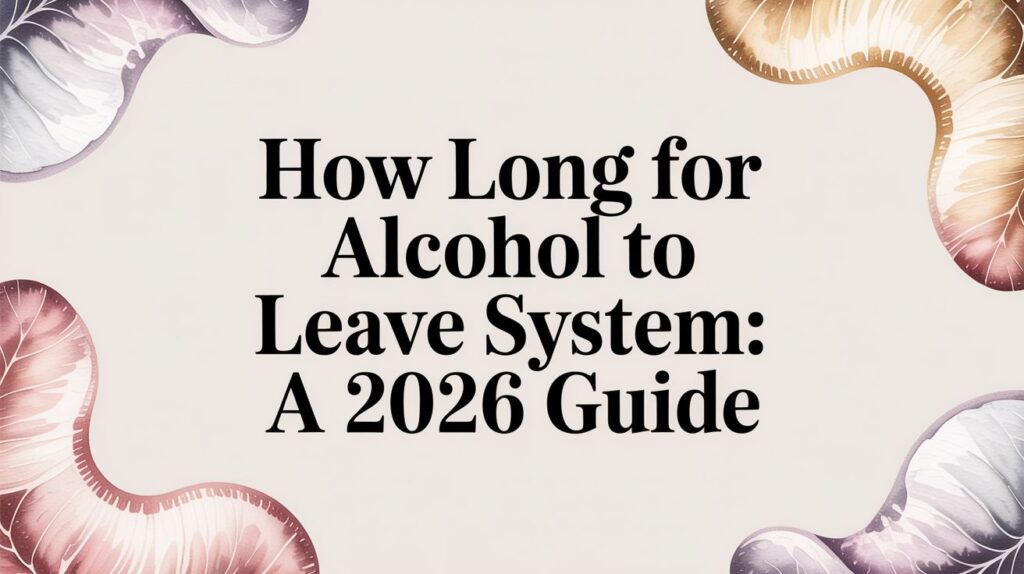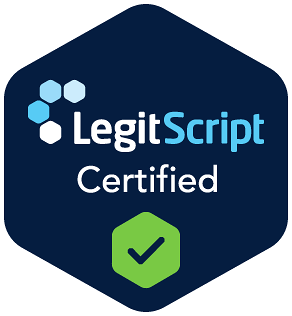Stepping from inpatient treatment into the next phase of recovery can feel both liberating and daunting. Sober living homes offer a crucial bridge, providing a structured, supportive environment that reinforces healthy habits and fosters a strong sense of community. The foundation of this environment is a clear, consistent set of sober living house rules.
These guidelines are not arbitrary restrictions. Instead, they are the architectural blueprint for a community dedicated to mutual support and sustained sobriety. Understanding these rules, not just what they are, but why they exist, is the first step toward leveraging this unique living situation for lasting change. For individuals navigating early recovery, these regulations create the predictability and accountability necessary to rebuild a life free from substance use.
This guide will break down the most common and critical rules you will encounter. We will provide a detailed look into the purpose behind each policy and offer practical, actionable advice for thriving within this structured setting. From mandatory meeting attendance to visitor policies, you will gain a comprehensive understanding of what to expect and how to succeed on your recovery journey.
1. Zero Tolerance Drug and Alcohol Policy
The absolute cornerstone of all sober living house rules is the strict, non-negotiable prohibition of drugs and alcohol. This zero-tolerance policy is the foundational principle that ensures the home remains a safe, trigger-free sanctuary for every resident committed to their recovery. It explicitly forbids the use, possession, or distribution of any mood-altering substances on the property. Furthermore, it prohibits residents from returning to the house while under the influence.
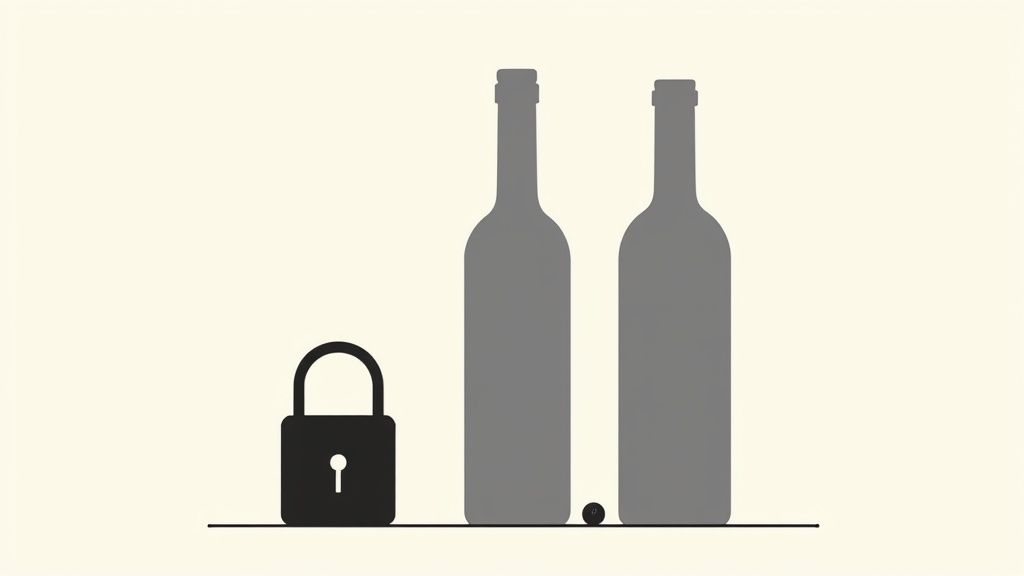
The primary reason for this rule's rigidity is to protect the collective sobriety of the community. A single instance of substance use can create a ripple effect, jeopardizing the hard-won progress of every other resident. Enforcing this policy requires a deep empathy and firmness, grounded in a clear grasp of the challenges involved. A critical aspect of maintaining this policy involves a thorough Understanding Drug and Alcohol Addiction, which helps staff and residents alike appreciate the necessity of such a strict boundary.
How It Works in Practice
Violation of this rule typically results in immediate removal from the home. This isn't a punitive measure but a necessary action to preserve the integrity of the recovery environment.
- Intake and Agreement: During the admission process, residents are required to read, understand, and sign a contract that explicitly details the zero-tolerance policy and the consequences of a violation.
- Regular Testing: Homes enforce this rule through scheduled and random drug and alcohol screenings (urinalysis, breathalyzer tests). This practice ensures accountability and acts as a powerful deterrent.
- Immediate Consequences: Facilities like those following the Oxford House model have a well-defined protocol where a resident who relapses is immediately asked to leave to protect the other members of the household.
Key Insight: The zero-tolerance policy is not about punishment; it is about protecting the safety and sobriety of the entire community. One person's relapse, if unaddressed, can act as a powerful trigger for others who are vulnerable.
This unwavering stance creates an environment where residents can focus entirely on their recovery without the threat of exposure to substances, making it one of the most vital sober living house rules for long-term success.
2. Mandatory Meeting Attendance
A core component of structured sober living is the requirement for active participation in recovery-focused gatherings. This rule mandates that residents attend a specified number of meetings each week, often ranging from three to five. These can include 12-step programs like Alcoholics Anonymous (AA) or Narcotics Anonymous (NA), house meetings, group therapy sessions, or other approved recovery-oriented activities. This requirement is fundamental to ensuring residents remain connected, accountable, and continuously engaged with their personal recovery journey.

The purpose of this rule is to combat the isolation that often fuels addiction and to build a strong support network. Consistent meeting attendance immerses residents in a community of peers who understand their struggles and can offer invaluable experience, strength, and hope. It reinforces the daily commitment to sobriety and provides a structured outlet for processing challenges. The community aspect is vital, as effective support from others is a cornerstone of long-term success. Understanding how to support someone in recovery is a skill that both residents and their loved ones can develop through these shared experiences.
How It Works in Practice
Sober living homes integrate this rule into the weekly schedule, treating it with the same seriousness as house chores or curfews. Compliance is typically tracked to ensure everyone benefits from this crucial practice.
- Setting Clear Expectations: Upon entry, residents are given a clear weekly meeting quota and a list of approved local meetings. This often includes a mix of 12-step meetings and mandatory in-house group sessions.
- Verification System: Attendance is usually verified through signed meeting slips or a peer-accountability system. This creates a simple but effective method for holding residents responsible for their commitment.
- Structured Integration: Many programs, such as those modeled after Oxford House, require a weekly house meeting where residents discuss household matters and support one another, in addition to their individual 12-step meeting requirements.
Key Insight: Mandatory meetings are not just about "checking a box." They are about building the life-saving habits of seeking support, sharing openly, and staying connected to a community that actively promotes sobriety.
3. Employment or Educational Requirement
A key component of sustainable recovery is building a life of purpose and responsibility, which is why most sober living house rules include a requirement for productive engagement. Residents are typically expected to secure employment, enroll in an educational program, or participate in approved volunteer work within a set timeframe, often 30 to 90 days. This rule is designed to instill structure, promote financial independence, and develop the essential life skills needed to thrive outside the supportive environment of the home.
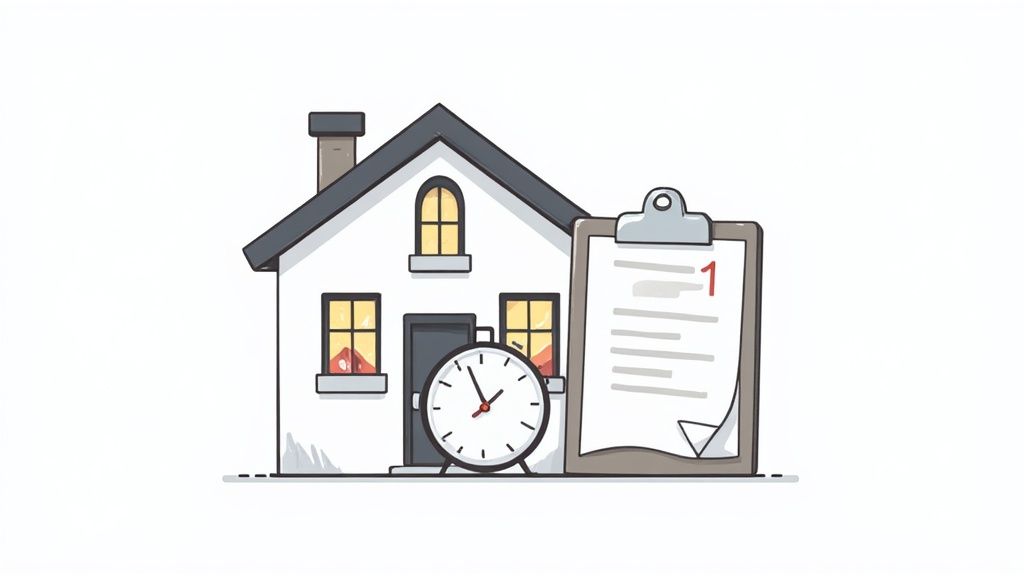
The primary goal of this requirement is to help residents reintegrate into society as self-sufficient, contributing members. Meaningful work or education provides a healthy daily routine, reducing idle time that can often be a trigger for relapse. It also rebuilds self-esteem and provides a constructive outlet for energy, which is a critical part of developing robust coping skills for substance abuse. This rule moves recovery from a theoretical concept to a practical, lived experience.
How It Works in Practice
Sober living homes often provide resources and support to help residents meet this important milestone, understanding it can be a significant challenge in early recovery. For those needing to fulfill the employment requirement, resources on creating a comprehensive job search plan can be invaluable.
- Structured Support: Many homes offer job search workshops, resume-building assistance, and interview coaching. Some, like the Delancey Street Foundation, have integrated work-study models where residents gain skills on-site.
- Partnerships: Successful programs often partner with recovery-friendly employers and vocational training centers, creating a direct pipeline to opportunities for residents.
- Phased Approach: Residents may be encouraged to start with part-time work or volunteer positions to gradually ease back into a structured schedule without becoming overwhelmed.
Key Insight: This rule is about more than just a paycheck or a degree; it's about rebuilding a life with purpose, structure, and accountability. Productive activity is a powerful antidote to the chaos and idleness that often fuel addiction.
By mandating productive engagement, sober living homes equip residents with the financial stability and personal confidence necessary for lasting independence in their recovery journey.
4. Curfew and Check-in Requirements
A structured curfew is a fundamental component of sober living house rules, designed to promote accountability, ensure resident safety, and maintain a secure environment. This rule establishes set times by which all residents must be back in the house, typically varying between weekdays and weekends. It’s not about controlling residents' freedom, but about creating a predictable, stable routine that supports early recovery and discourages late-night activities that could pose a risk to sobriety.

The primary goal of a curfew is to re-establish a healthy daily structure, which is often lost during active addiction. Knowing they must be home by a certain time helps residents plan their days productively, balancing work, meetings, and personal time. This structure is a key element in rebuilding self-discipline and responsibility. As outlined by resources on transitioning to sober living, creating these boundaries is vital for managing triggers and avoiding the unstructured, isolated environments where relapse is more likely to occur.
How It Works in Practice
Consistent enforcement and clear communication are crucial for a curfew policy to be effective. The rules are designed to be firm yet accommodating to real-world needs like work schedules.
- Set Schedules: Most homes have standard curfews, such as 11 PM on weekdays and midnight or later on weekends. For example, some sober living homes implement a 10 PM curfew Sunday through Thursday, offering more flexibility on Friday and Saturday.
- Approval for Exceptions: Residents needing an extension due to work, family events, or other valid reasons must request it in advance. This process reinforces communication and accountability with house management.
- Progress-Based Adjustments: As residents demonstrate stability and commitment to their recovery program, some houses, like those with phased step-down programs, may offer later curfews or overnight passes as a privilege.
Key Insight: Curfews are not arbitrary restrictions. They are a practical tool to help residents avoid risky situations, ensure they get adequate rest, and create a predictable rhythm that is conducive to a healthy recovery lifestyle.
5. Shared Responsibility and Chore System
Beyond individual recovery, sober living homes emphasize community and mutual support, which begins with the shared environment. A structured chore system is a fundamental rule that requires all residents to participate actively in maintaining the cleanliness and order of the house. This system is not just about keeping the space tidy; it's a therapeutic tool designed to instill accountability, build essential life skills, and foster a sense of collective ownership and pride in the home.
This rule transforms the daily act of housekeeping into a lesson in responsibility and teamwork. By contributing to the home's upkeep, residents learn to manage their time, collaborate with others, and take pride in their living space. Models like the Phoenix House community responsibility model integrate these tasks as part of a holistic approach, recognizing that structure and routine are vital for rebuilding a life free from substance use. It's a practical application of the principles learned in recovery.
How It Works in Practice
A well-organized chore system is transparent, fair, and consistently enforced. It ensures every resident contributes equally, preventing resentment and reinforcing the idea that everyone plays a vital role in the community's well-being.
- Visible Chore Charts: Homes typically post a clear, written chore schedule in a common area. This chart details specific tasks, assigned residents, and completion deadlines.
- Rotation and Fairness: To ensure fairness and expose residents to different responsibilities, chores are rotated on a weekly or bi-weekly basis. This prevents burnout and teaches a wider range of skills.
- Accountability Measures: If a resident neglects their assigned duties, there are clear, pre-established consequences. These are not punitive but are designed to reinforce accountability, such as a temporary loss of privileges or a requirement to complete the missed task.
Key Insight: A chore system does more than keep a house clean; it actively rebuilds the structure, discipline, and self-worth that are often damaged by addiction. It teaches that small, consistent efforts lead to a stable and positive environment.
This foundational component of sober living house rules helps residents transition from a passive role in their lives to becoming active, responsible participants in their community and their own recovery.
6. Visitor and Guest Restrictions
To protect the privacy, security, and recovery-focused atmosphere of the home, sober living house rules almost always include strict policies on visitors and guests. These regulations are designed to prevent the introduction of drugs or alcohol, minimize disruptions, and maintain a safe, predictable environment for all residents. The rules typically govern who can visit, when they can visit, and where on the property they are permitted.
These restrictions are not meant to isolate residents but to create a secure space where they can focus on their recovery without external pressures or potential triggers. Managing outside influences is a critical component of early sobriety, and these rules provide a necessary buffer. This approach helps residents practice setting boundaries in recovery, an essential skill for navigating relationships and social situations long-term.
How It Works in Practice
Clear, consistently enforced visitor policies are key to maintaining the integrity of the sober living home. These rules are explained during intake and are non-negotiable.
- Pre-Approval and Sign-In: Most homes require visitors to be pre-approved by staff or house management. Upon arrival, guests must sign in, and they are often required to remain in designated common areas.
- Defined Visiting Hours: To ensure minimal disruption to house schedules and meetings, visiting is restricted to specific days and times. For example, some homes, like Clean and Sober Living, may enforce an 8 PM visitor curfew.
- No Overnight Guests: Overnight guests are generally prohibited. In some models, like Oxford House, an exception might be made for a family member, but only after a formal house vote and unanimous approval from all residents.
Key Insight: Visitor rules are a protective measure for the entire community. They shield residents from potentially negative influences and ensure the home remains a sanctuary dedicated solely to recovery, free from outside drama or triggers.
By controlling access to the property, the house can better guarantee a stable and supportive environment, which is fundamental to the sober living experience.
7. No Violence or Threats Policy
A commitment to physical and emotional safety is paramount in a healing environment. For this reason, sober living house rules universally include a strict zero-tolerance policy against violence, threats, and aggressive behavior. This rule ensures the home remains a secure space where residents can be vulnerable and focus on recovery without fear of harm, intimidation, or verbal abuse from fellow residents, staff, or visitors. It establishes a baseline of respect necessary for building a supportive community.
The rationale behind this rule is to eliminate a significant trigger for relapse: stress and fear. Recovery requires an environment free from hostility, where individuals feel safe enough to engage in self-reflection and build healthy relationships. Establishing a clear protocol for conflict resolution is crucial, as disagreements are inevitable. Organizations like Phoenix House implement robust conflict resolution and de-escalation protocols to manage disputes constructively, preventing them from escalating into aggression and ensuring the safety of all residents.
How It Works in Practice
Violating this policy almost always results in immediate eviction. This swift action is not merely punitive; it is a critical measure to protect the well-being and safety of everyone in the home.
- Explicit Agreement: Upon entry, every resident must sign an agreement acknowledging their understanding of the no-violence policy and the immediate consequences of breaching it.
- Conflict Resolution Training: Homes often provide mandatory training or group sessions on healthy communication and conflict resolution, equipping residents with the tools to manage disagreements peacefully.
- Clear Reporting Channels: Residents are informed of a clear, confidential process for reporting any threats or violent acts to house management without fear of retaliation.
- Immediate Intervention: Staff are trained in crisis intervention and de-escalation. As seen in programs run by Volunteers of America, immediate intervention is standard practice when tensions rise, protecting the community from potential harm.
Key Insight: This policy is about more than just preventing physical fights. It’s about cultivating an atmosphere of mutual respect and psychological safety, which is essential for the deep emotional work required in recovery.
8. Financial Responsibility and Rent Payment
A crucial component of rebuilding a stable, independent life is mastering financial accountability, making it a key element of sober living house rules. This rule requires residents to pay their rent, fees, and shared expenses on time, fostering essential life skills in money management and personal responsibility. It moves recovery beyond clinical treatment into the practical realities of self-sufficiency, which is a significant part of long-term stability and one of the core benefits of getting sober.
The rationale behind this rule is to empower residents by helping them develop the habits necessary to support themselves. Financial stress is a major relapse trigger, and learning to manage money effectively reduces this risk. To successfully manage the financial expectations of sober living, residents can benefit from learning practical budgeting strategies, which helps them regain control over their finances and build confidence. Models like the Delancey Street Foundation emphasize economic self-sufficiency as a cornerstone of recovery.
How It Works in Practice
Sober living homes structure this rule to teach, not to penalize. The goal is to create a supportive framework where residents can learn to handle their financial obligations responsibly.
- Clear Payment Structure: Residents are provided with a clear schedule for rent and other fees upon intake. This often includes weekly or monthly payments and a security deposit.
- Democratic Fee-Setting: In some models, like Oxford House, residents vote on house expenses and rent contributions, promoting a sense of ownership and shared responsibility.
- Income-Based Assistance: Some facilities, such as Step Forward, may offer a sliding scale rent based on a resident’s income, or work-study programs that allow residents to contribute through service.
Key Insight: Financial responsibility is not just about paying bills; it is about rebuilding self-esteem and proving to oneself that a stable, independent life is achievable in sobriety.
By integrating financial accountability into the recovery process, sober living homes equip residents with the practical skills needed to thrive outside the supportive environment.
Sober Living House Rules Comparison
| Policy / Requirement | Implementation Complexity 🔄 | Resource Requirements ⚡ | Expected Outcomes 📊 | Ideal Use Cases 💡 | Key Advantages ⭐ |
|---|---|---|---|---|---|
| Zero Tolerance Drug and Alcohol | High – requires regular testing and strict enforcement | Moderate – drug tests, monitoring staff | Substance-free environment, strong accountability | Sober living houses prioritizing strict sobriety | Ensures safety and sobriety for all residents |
| Mandatory Meeting Attendance | Moderate – tracking attendance and verification | Low to moderate – coordination with programs | Strong recovery focus, support network building | Recovery programs emphasizing community connection | Builds routine and recovery engagement |
| Employment or Educational Requirement | Moderate – tracking employment/education status | Moderate – job support resources | Financial independence, life skills development | Programs focusing on personal responsibility | Encourages self-sufficiency and skill building |
| Curfew and Check-in Requirements | Low to Moderate – enforcing schedules and approvals | Low – monitoring systems | Enhanced safety, structured daily routine | Houses needing safety and predictability | Provides security and routine |
| Shared Responsibility and Chore System | Moderate – scheduling and oversight needed | Low – materials and oversight time | Teaches accountability and teamwork | Communal living environments aiming at ownership | Builds community ownership and life skills |
| Visitor and Guest Restrictions | Moderate – approval and monitoring required | Low to Moderate – screening processes | Security, privacy protection | Facilities protecting resident safety and privacy | Prevents substance introduction and conflicts |
| No Violence or Threats Policy | Moderate – enforcement and reporting systems | Low – training and monitoring | Safe, peaceful environment | All sober living environments | Protects residents and maintains peace |
| Financial Responsibility and Rent Payment | Moderate – payment tracking and support needed | Moderate – finance management tools | Financial accountability, sustainable operations | Programs supporting financial independence | Prepares residents for independent living |
Building Your Future on a Foundation of Structure
Navigating the landscape of early recovery can feel overwhelming, but the structured environment of a sober living home provides a vital roadmap. As we've explored, the common sober living house rules are not arbitrary restrictions designed to control residents. Instead, they are carefully crafted pillars of support, each serving a distinct and crucial purpose in building a sustainable, sober future. From the non-negotiable zero-tolerance policy that guarantees a safe environment to the shared chore system that fosters responsibility and teamwork, these guidelines are the practical application of recovery principles.
Think of these rules as the framework of a new house you are building for your life. The mandatory meetings are the foundation, connecting you to a community of support. The employment and financial responsibilities are the walls, teaching you self-sufficiency and stability. Curfews and guest policies act as the roof and locks, protecting your newfound sobriety from external pressures and old triggers. Each rule is a building block, and when assembled, they create a secure and stable structure where you can truly heal and grow.
From Rules to Routine: Internalizing Recovery
The ultimate goal of adhering to sober living house rules is to internalize these healthy behaviors until they become second nature. Initially, checking in for curfew or attending a daily meeting might feel like a chore. Over time, however, these actions transform into empowering routines. You begin to appreciate the peace of mind that comes with a structured evening and look forward to the connection and wisdom gained from meetings.
This transition from external compliance to internal motivation is where true recovery takes root. The structure that once felt imposed becomes a source of personal strength and discipline. You learn to manage your time, communicate effectively with housemates, and hold yourself accountable, not because a rulebook tells you to, but because you recognize these skills are essential for the life you want to lead. This is the profound value of the sober living experience: it provides a safe, controlled space to practice sobriety until it becomes an integral part of your identity. Embracing this process wholeheartedly is the key to turning a transitional living arrangement into a launchpad for lifelong success.
Ready to integrate a supportive, structured recovery plan into your life? A quality sober living home paired with comprehensive outpatient care offers the best of both worlds. Contact Altura Recovery to learn how our flexible and evidence-based treatment programs can complement your sober living journey and provide the clinical support you need to build a lasting foundation for sobriety. Visit us at Altura Recovery to get started.



